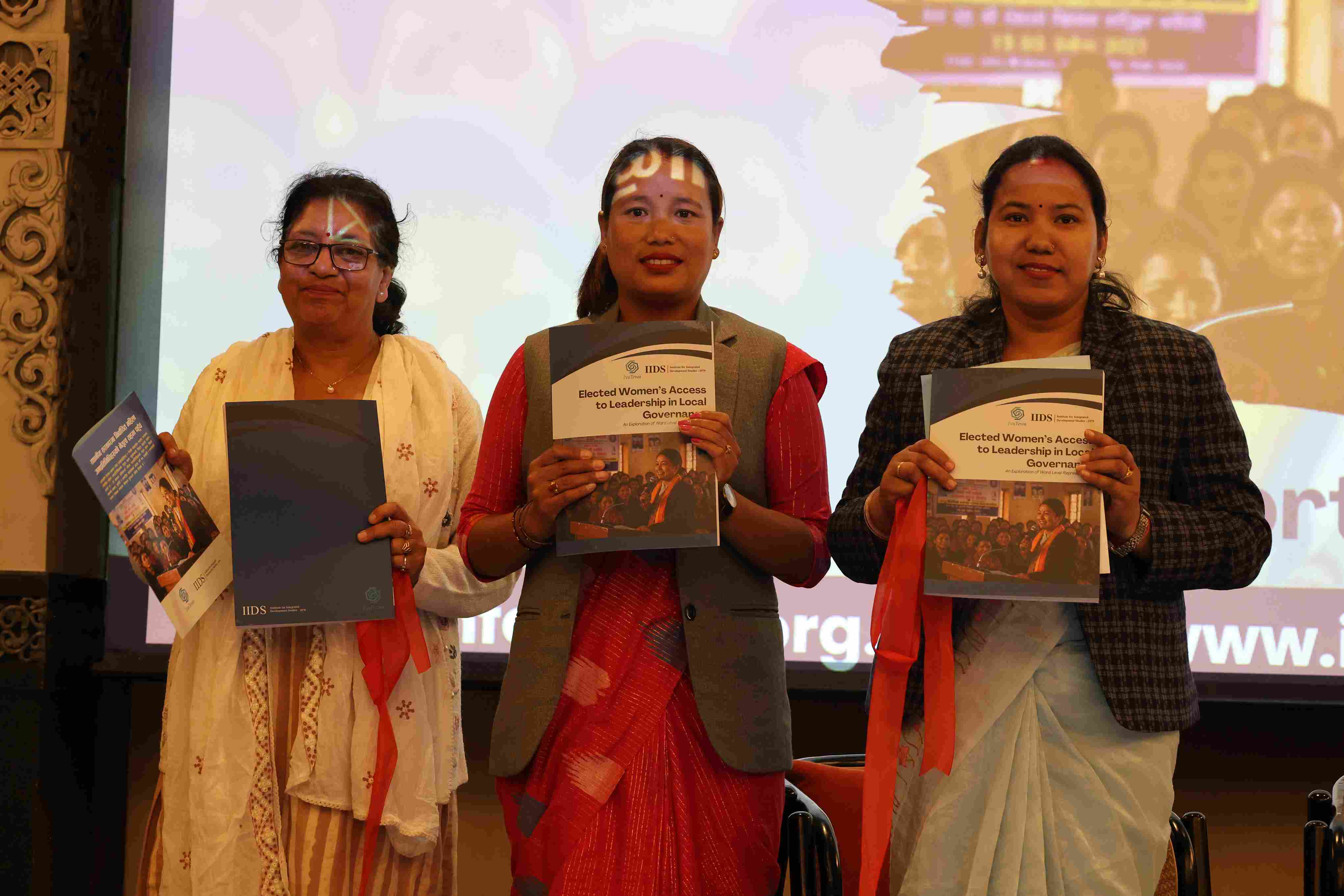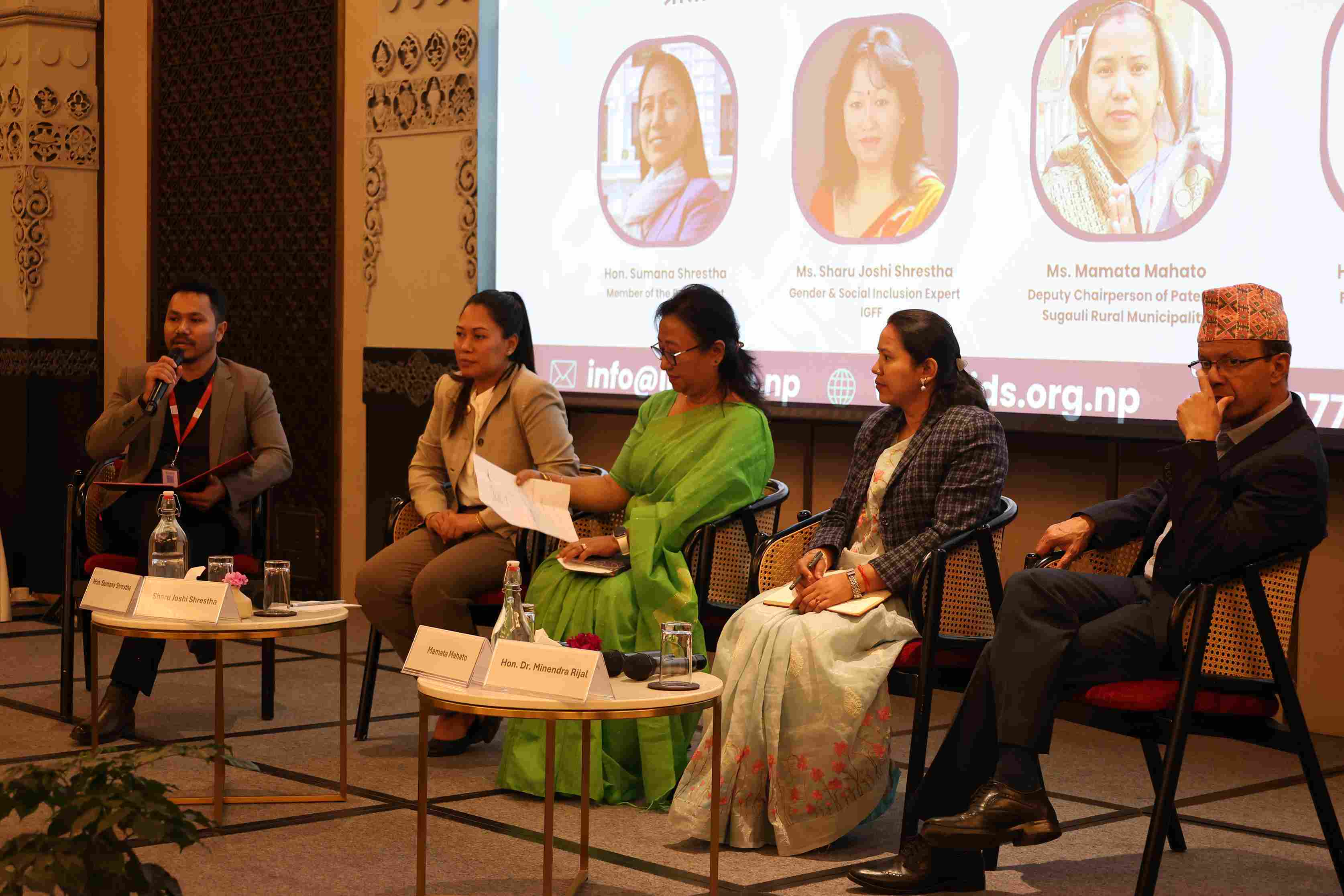Elected Women | Leadership |Local Governance | Gender Inclusivity | Authority Challenges

A recent study by the Institute for Integrated Development Studies (IIDS) reveals that elected women representatives in Nepal face significant challenges in exercising real authority within local governance structures despite constitutional mandates for gender inclusivity.
The report titled ‘Elected Women’s Access to Leadership in Local Governance’ was launched amid an event in Kathmandu on March 16.
While women constitute 40.96% (14,352 out of 35,041) of elected local representatives, they occupy only 2% of mayoral and chairperson roles across the 753 local governments. In contrast, women hold 91% of deputy positions, indicating a systemic pattern where they are relegated to secondary roles with limited decision-making power.
The report was officially unveiled and followed the presentation of the report findings by Dr Sucheta Pyakuryal, the lead of the study team.
She highlighted that most local level decisions, dominated by men, were made outside formal settings of ward and municipal executive council meetings. “The men members would already make a decision at informal settings like tea shops” and force women members to sign documents if required. Political parties often nominate women based on loyalty rather than leadership potential, perpetuating tokenism and hindering genuine empowerment.
Nevertheless, Dr Pyakuryal shared that reservation (quota) has helped women, including from marginalised communities like Dalit, come to decision-making platforms, and the system should continue for more years to come.
The study highlights that 71.39% of elected women serve as ward members through reserved quotas, whereas only 0.50% have secured ward chair positions. This disparity underscores the gap between numerical representation and actual leadership.
National Assembly member and former Foreign Affairs Minister Dr Bimala Rai Paudyal and Dr Nisha Onta, founder and executive director of Governance Lab, passed technical commentaries on the study and its findings.
Dr Paudyal praised the study, noting that while most research focuses on women representation in provincial and municipal (mayoral) offices, it considered wards level — the closest level of government to the people.
But the study lacks historical and political context post 1990 restoration of multiparty democracy that pushed lawmakers to be gender inclusive. In 1999, Nepal enacted the Local Self Governance Act that mandated one out of five ward members must be a woman, she added. “By that simple provision, about 40,000 women came into public office.”
She highlighted that many women entered politics through community involvement rather than formal political experience, and the need for deeper analysis of these institutional structures.
The study reveals that most elected women representatives in local governance come from non-political backgrounds, with 71.64% engaged in farming before entering politics.
Other significant pre-election engagements include membership in women’s groups or user groups (22.51%), political party affiliations (22.26%), and self-employment or business ownership (19.15%).
Educational attainment among these representatives is alarmingly low. About 29.6% have no formal education, while only 3.11% possess a bachelor degree. This educational deficit hampers their ability to engage effectively in governance, and navigate administrative and legal procedures.
Dr Paudyal stressed the importance of addressing access to finance, education, and skills through comprehensive social mapping at lower ward levels rather than high levels. She also urged greater emphasis on men sharing household responsibilities to support balanced leadership.
Her key recommendations included prioritising political parties in addressing capacity gaps, and ensuring leadership development includes women without political connections for broader inclusivity.
Dr Onta pointed out that the study did not look into the “power under”, where women in leadership struggle to exercise authority despite holding positions, and the study lacked representation from grassroots activists, local organisations, and marginalised groups such as Dalits, LGBTQ+ individuals, and persons with disabilities, limiting its inclusivity.
“The study could have included disability and LGBTQIA+ [variables] and taken a more intersectional approach marked by caste to make it richer,” she added. “A more nuanced reasoning other than just ‘upper caste’ men” should have been analysed as people bearing the flag of patriarchy irrespective of gender.
The event entered a panel discussion. Lawmaker and former Education Minister Sumana Shrestha, GESI Expert Sharu Joshi Shrestha, Deputy Chair of Paterwa Sugauli Rural Municipality (Parsa, Madhesh) Mamata Mahato, and former Defence Minister Dr Minendra Rijal were on the panel.

Lawmaker Shrestha highlighted the systemic barriers women face in politics, including party favouritism, resource limitations for independent candidates, and minimal speaking opportunities in Parliament.
She stressed the need for electoral reforms such as partyless local elections, stricter regulations on election spending, and improved accountability to create a more inclusive political environment. Despite efforts to open positions to all, women still struggle to voice concerns and receive adequate training.
“Many politicians enter through party networks but lack essential governance, research, and management skills.” She emphasised that political parties alone cannot provide sufficient training; instead, governance and leadership education should begin at the school level.
To truly empower women, she advocated for hands-on leadership training, fair ticket distribution, and breaking regressive political practices to ensure equal opportunities for all.
Mahato, who is also president of Deputy Mayors’ Club, Parsa, reiterated the lack of meaningful participation for women at the ward level despite their representation.
“Men are prioritised in official talks. The state does not make efforts towards making them accessible for women representatives.” Budget constraints and structural barriers limit their influence in development plans, and decision-making spaces remain inaccessible, she added.
A significant concern is the exclusion of women from financial deliberations, the study reports. Less than 10% reported active participation in budget discussions, and over 60% had no involvement in fund allocation processes. Such exclusion not only diminishes their influence but also perpetuates existing power imbalances within local governance.
“While securing a ticket is easier due to lower competition,” she recalled, winning elections is difficult due to financial burdens and societal biases favouring men, discouraging many capable women.
Mahato emphasised the need for economic and educational empowerment and reforms in party ticket distribution to enhance women’s political involvement. “Women should run for upper offices in the upcoming election. Those who are ward members should be encouraged to run for ward presidents, and those in deputy positions run for chief.”
Shrestha, the GESI expert at Inter-Generational Feminist Forum, acknowledged global progress in women’s political inclusion but noted Nepal’s lag despite constitutional quotas ensuring 33% representation.
She highlighted that gender roles hampered women. “Women representatives have to carry their office responsibilities through household work”, which yields no income.
Elections becoming expensive and lack of resources amid enforced gender roles reinforces the narrative that direct election is for men and proportional is for women, she added. Additionally, she shed light onto a tendency to limit marginalised groups like Dalits to ward level with no efforts to empower them to contest higher offices. Alongside voters’ education, she called for “candidacy education”, leadership training and stronger laws against harassment.
Dr Rijal recognised progress in achieving one-third of female representation at the ward level but stressed the need for deeper empowerment beyond quotas. He emphasised merit-based inclusion over tokenism and highlighted grassroots challenges like resource limitations.
Systemic barriers hinder the 33% female representation rule in ticket distribution, making gender balance difficult for political parties. True empowerment requires developing women’s leadership, ensuring competence-based appointments, and providing sustained support at all levels.
In his special remarks session, Chief Election Commissioner Dinesh Kumar Thapaliya emphasised electoral reforms to enhance women’s political impact in Nepal. “Despite increased representation, systemic barriers like restrictive ticket distribution and inadequate capacity-building hinder progress.”
Reiterating that previous laws provided meagre responsibilities like overseeing the works of chief in their absence, he added that the post of deputies (women hold 91% of them) should not be undermined as the current law provides crucial responsibilities like project monitoring and judicial committee, among others exclusively in leadership of this particular post.
He advocated for localised solutions, data-driven decision-making, and addressing misconceptions about women in leadership. With shifting voting trends favouring women leaders, he calls for meaningful inclusion through strengthened democracy and empowerment beyond symbolic roles.
The report finds that motivation to contest elections stemmed from a desire to address local issues, community service, and encouragement from family or political networks. However, systemic barriers such as lack of financial resources, patriarchal party structures, and exclusion from key decision-making processes continue to hinder their growth as political leaders.
Executive Director of Tewa, a women’s fund, Urmila Shrestha concluded the event with her closing remarks. Stating that women should be economically empowered, she stressed prioritising women candidacy in the upcoming election with the slogan, ‘[20]84 maa Mahila Pahila’, which translates to ‘Women first in 2027 [local elections]’.
The IIDS report calls for systemic reforms to transform nominal representation into substantive leadership. Recommendations include mandatory leadership training, enforcement of gender-sensitive budgeting, political party reforms to promote capable women to executive positions, and mentorship programs to bolster leadership skills and political networking.
Despite legal frameworks supporting gender equality, the study warns that without urgent reforms, women’s roles in governance will remain largely symbolic, failing to translate into genuine empowerment and decision-making authority.
Read More Stories
Kathmandu’s decay: From glorious past to ominous future
Kathmandu: The legend and the legacy Legend about Kathmandus evolution holds that the...
Kathmandu - A crumbling valley!
Valleys and cities should be young, vibrant, inspiring and full of hopes with...
The majestic Upper Mustang and its water troubles
The wind stirs heavily across the barren landscape as our bus pushes along...